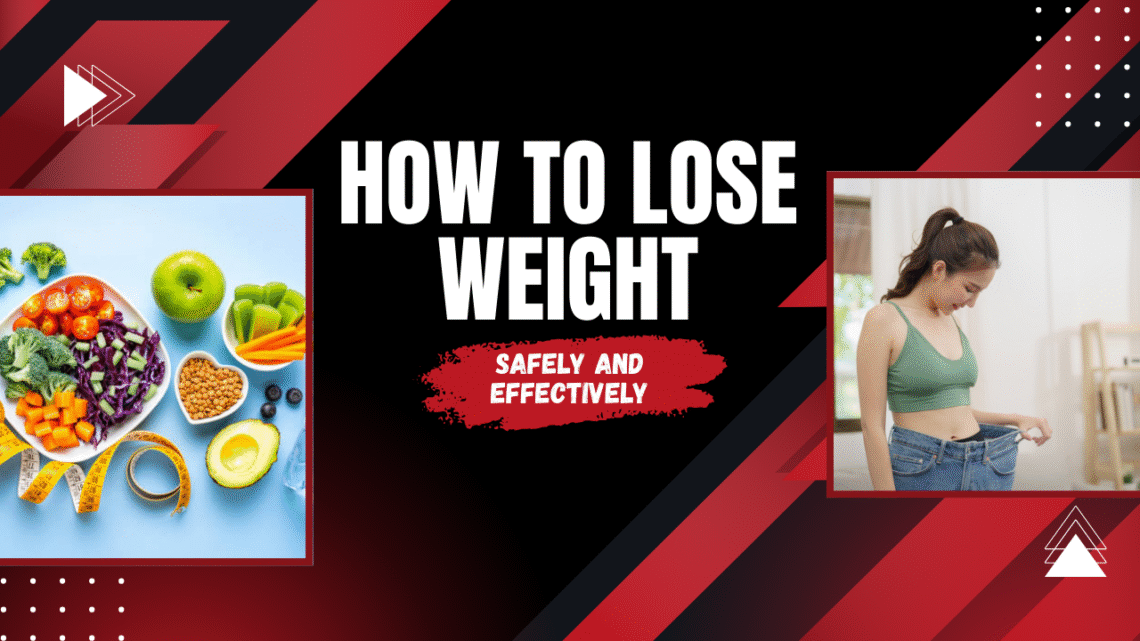In today’s fast-paced world, where fast food is often more accessible than fresh produce, maintaining a healthy weight can feel like a daunting task. With endless diet trends, supplements, and weight-loss promises circulating online, it’s easy to feel overwhelmed or misled by quick fixes and unrealistic expectations.
But here’s the truth: if you want to know how to lose weight safely and effectively, it’s not about depriving yourself or overexerting in the gym. It’s about creating balanced habits—ones that nourish your body, respect your limits, and fit into your lifestyle for the long haul. Weight loss should always prioritize health, not just numbers on a scale.
In this guide, you’ll discover science-backed strategies to shed weight the right way, avoid common pitfalls, and build a strong foundation for lifelong wellness. Plus, we’ll share eight powerful tips to stay healthy and motivated throughout your journey.
Understanding Safe and Effective Weight Loss (How to Lose Weight)
What Is Safe Weight Loss?

Safe weight loss isn’t about rapid transformations—it’s about steady progress that your body can maintain. Experts like the CDC and WHO recommend aiming for a gradual loss of 1 to 2 pounds (0.5 to 1 kg) per week. While this may seem slow, it’s the most effective and sustainable pace for long-term results.
Trying to lose weight too quickly often backfires. Crash diets and excessive exercise can cause muscle loss, slow down your metabolism, and create serious nutritional deficiencies. In some cases, rapid weight loss can even lead to health issues like gallstones, fatigue, or a weakened immune system.
Choosing a safer, slower path allows your body to adapt and adjust in a healthy way. It gives you time to develop lasting habits around eating, movement, and self-care. Safe weight loss isn’t just about the scale—it’s about protecting your health and setting yourself up for lasting success.
Why Quick Fixes Don’t Work
Many crash diets or extreme calorie-cutting plans can lead to:
- A slowed metabolism
- Loss of lean muscle mass
- Nutrient deficiencies
- Yo-yo dieting (repeated cycles of losing and regaining weight)
Safe and effective weight loss emphasizes creating a healthy calorie deficit, building sustainable habits, and focusing on overall well-being rather than just the number on the scale.
Foundations of Healthy Weight Loss
1. Caloric Deficit — But Not Too Much
To lose weight, you must consume fewer calories than you burn. However, it’s essential not to starve your body. The recommended calorie deficit is about 500 to 750 calories per day, leading to a safe weekly weight loss of 1–2 pounds.
Example: If you burn 2,500 calories daily, aim to eat about 1,750 to 2,000 calories.
2. Balanced Macronutrients
Ensure you’re getting enough of the three macronutrients:
- Protein: Supports muscle mass and satiety
- Healthy fats: Aid in hormone production and absorption of nutrients
- Complex carbs: Provide sustained energy and fiber
3. Hydration (How to Lose Weight)

Water is crucial for metabolism, digestion, and appetite regulation. Drinking enough water can:
- Suppress unnecessary hunger
- Improve energy levels
- Support kidney function
Aim for at least 8-10 cups of water daily, more if you’re active.
Effective Strategies for Weight Loss
1. Eat Whole, Nutrient-Dense Foods
When you’re learning how to lose weight, one of the most effective strategies is choosing foods that are rich in nutrients but lower in calories. These foods provide your body with the vitamins, minerals, and fiber it needs to stay healthy—without adding unnecessary calories that can slow down your progress.
Focus on whole foods like fruits, vegetables, lean proteins, whole grains, and legumes. These not only support digestion and metabolism but also keep you feeling full longer, which helps reduce the urge to overeat. Avoid highly processed snacks, sugary drinks, and fast food, which are high in calories and low in nutritional value.
Understanding how to lose weight doesn’t mean starving yourself—it means making smarter food choices. Fill your plate with colorful, nutrient-dense foods that satisfy your hunger and support your goals. When combined with regular exercise, hydration, and good sleep, these simple changes can lead to lasting weight loss and better overall health:
- Fresh fruits and vegetables
- Whole grains (like oats, brown rice, quinoa)
- Lean protein sources (chicken, fish, tofu, legumes)
- Healthy fats (nuts, seeds, olive oil, avocado)
These foods not only aid weight loss but also support overall health.
2. Control Portion Sizes
Even healthy food can contribute to weight gain when consumed in large amounts. Portion control is a critical part of any plan focused on how to lose weight. Foods like nuts, avocados, whole grains, and dried fruits are packed with nutrients but also contain a high number of calories. Eating them in moderation is key to maintaining a healthy balance.
Using tools like measuring cups, food scales, and tracking apps can help you understand how much you’re actually eating. These tools are especially helpful when starting out, as they make it easier to identify proper portion sizes and stay within your calorie goals. Being aware of serving sizes—even for healthy meals—ensures you’re fueling your body without overdoing it.
Learning how to lose weight effectively means being mindful of not just what you eat, but how much. Smart habits like portion control, meal prepping, and mindful eating can make a lasting difference in your weight loss journey:
- Smaller plates
- Measuring cups or kitchen scales
- Mindful eating techniques (How to Lose Weight)
Eating slowly and savoring each bite helps prevent overeating.
3. Stay Consistent With Physical Activity

Exercise plays a vital role when learning how to lose weight effectively and safely. It not only helps burn calories but also boosts your metabolism, allowing your body to continue burning fat even after workouts. Whether it’s brisk walking, cycling, swimming, or strength training, regular physical activity is one of the most powerful tools in your weight loss journey.
Beyond just burning calories, exercise is essential for maintaining lean muscle mass. As you lose weight, your body may also lose muscle if you’re not careful. Incorporating strength training into your routine helps preserve muscle and ensures that the weight you lose comes primarily from fat. This makes your body look toned and your metabolism more efficient.
Additionally, exercise has a positive impact on mental health. It reduces stress, improves mood, and increases energy—all of which can help you stay motivated and consistent. If you’re looking for how to lose weight and keep it off, exercise is non-negotiable.
- Cardio: Walking, running, swimming, cycling — helps burn fat
- Strength training: Builds muscle, which increases metabolism
- Flexibility and balance: Yoga, Pilates
Aim for at least 150 minutes of moderate exercise or 75 minutes of intense activity per week, combined with strength training twice weekly.
Top 8 Tips to Stay Healthy While Losing Weight
Looking to improve your health and shed a few pounds? Learning how to lose weight doesn’t have to be complicated. In fact, adopting simple, consistent habits can lead to lasting results. By focusing on both physical and mental well-being, you can create a sustainable plan that fits your lifestyle and supports overall wellness.
Start by eating whole, nutrient-dense foods like vegetables, fruits, lean proteins, and whole grains. Drink plenty of water, get at least 7 hours of quality sleep, and stay active with regular movement—whether it’s walking, strength training, or yoga. Managing stress through meditation or deep breathing can also reduce emotional eating and support healthy choices.
The key to how to lose weight effectively is balance. Don’t aim for perfection; instead, aim for progress. These eight simple tips can help you feel better, look better, and live healthier without extreme diets or restrictions. Small steps taken daily lead to big, sustainable changes:
1. Set Realistic Goals (How to Lose Weight)
Don’t expect overnight miracles. Set achievable, measurable goals like:
- Losing 4–8 pounds in a month
- Going for a 30-minute walk daily
- Cooking 5 healthy meals per week
Small wins lead to lasting habits.
2. Track Your Progress (How to Lose Weight)

One of the most effective ways to stay on track with your health journey is by monitoring your progress. Whether you’re changing your eating habits or starting a new exercise routine, tracking can help you stay focused. Learning how to lose weight starts with understanding what works for your body—and tracking is the key to that insight.
Keeping a journal or using apps like MyFitnessPal or Fitbit allows you to record your meals, workouts, water intake, and even your mood. This helps you recognize patterns, identify what’s helping or holding you back, and celebrate your progress. It’s a great way to stay accountable and motivated, especially on tough days.
If you’re serious about learning how to lose weight, consistency is everything. Tracking your efforts gives you a clear picture of your journey and helps you make smarter choices. Over time, it builds healthier habits that lead to long-term, sustainable weight loss :
- Food intake
- Physical activity
- Weight and measurements
Tracking helps identify patterns and keeps you accountable.
3. Prioritize Sleep (How to Lose Weight)
Sleep plays a critical role in weight management, yet it’s often overlooked. When you don’t get enough rest, it disrupts key hormones like ghrelin and leptin—responsible for controlling hunger and fullness. Ghrelin increases appetite, while leptin signals when you’re full. A lack of sleep throws this balance off, causing you to feel hungrier and crave high-calorie, sugary foods. This makes it harder to maintain a healthy diet and can lead to weight gain.
Understanding how to lose weight isn’t just about counting calories or exercising—sleep is a major factor. Poor sleep habits can increase late-night snacking and reduce energy for physical activity the next day. It also affects decision-making, making it easier to give in to unhealthy food choices.
If you want to learn how to lose weight effectively, prioritize 7–9 hours of quality sleep each night. Along with proper nutrition and movement, restful sleep is essential for lasting weight loss results.
- Aim for 7–9 hours of quality sleep per night
- Establish a relaxing bedtime routine
- Avoid screens and caffeine before bed (How to Lose Weight)
4. Manage Stress
Chronic stress is one of the most overlooked barriers when learning how to lose weight. When your body is under constant stress, it releases high levels of cortisol—a hormone linked to increased fat storage, particularly around the belly area. This type of fat is not only stubborn but also associated with higher risks of health issues like heart disease and diabetes.
Elevated cortisol levels can also lead to cravings for sugary, high-fat foods, making it harder to stick to a balanced diet. Emotional eating often becomes a coping mechanism, which adds to weight gain over time. That’s why managing stress is a crucial part of any plan focused on how to lose weight effectively.
Practicing relaxation techniques such as deep breathing, meditation, yoga, or even taking short walks can lower cortisol levels naturally. A calm mind supports better decision-making, healthier food choices, and improved sleep—all of which are essential when learning how to lose weight the healthy way.
- Try meditation, deep breathing, journaling
- Take regular breaks
- Spend time in nature or with loved ones
5. Avoid Processed Foods
Highly processed foods often contain:
- Added sugars
- Unhealthy fats
- Empty calories
Stick to natural, whole-food options whenever possible.
6. Don’t Skip Meals
Skipping meals can lead to extreme hunger and overeating later. Instead, eat balanced meals and healthy snacks like:
- Greek yogurt with berries
- Nuts and fruit
- Whole grain toast with avocado
7. Stay Socially Supported
Having a support system increases your chances of success.
- Join a fitness class or walking group
- Share your goals with friends or family
- Consider seeing a dietitian or therapist if needed
8. Be Patient and Kind to Yourself
There will be setbacks. That’s normal. What matters most is how you bounce back.
- Don’t punish yourself for indulgences
- Celebrate progress, not perfection
- Focus on how you feel, not just what you weigh
Sample Meal Plan for Safe Weight Loss
Here’s a sample one-day meal plan based on ~1,800 calories:
Breakfast:
- Oatmeal with banana, almonds, and cinnamon
- Black coffee or herbal tea
Snack:
- Greek yogurt with berries
Lunch:
- Grilled chicken breast
- Quinoa salad with mixed greens, cucumber, tomatoes, olive oil dressing
Snack:
- Apple with peanut butter
Dinner:
- Baked salmon
- Steamed broccoli
- Sweet potato
Hydration:
- At least 8 glasses of water throughout the day
What to Avoid When Trying to Lose Weight
- Starvation or very low-calorie diets: May result in muscle loss, fatigue, and metabolic slowdown
- Over-reliance on supplements or detox teas: These are often unregulated and ineffective
- Extreme exercise routines without rest: Can cause burnout or injury
- Comparison with others: Everyone’s journey is different. Focus on your progress.
Maintaining Your Weight Loss

Losing weight is an achievement—but keeping it off is where the real challenge begins. Many people regain weight because they return to old habits once they reach their goal. That’s why it’s essential to treat weight loss not as a finish line, but as a lifestyle shift.
The key to maintaining weight loss lies in consistency. Continue eating balanced meals rich in whole foods, stay physically active most days of the week, and prioritize sleep and stress management. These habits shouldn’t feel like punishment—they should become part of your routine because they make you feel good and energized.
Also, keep monitoring your progress—not just your weight, but how you feel mentally and physically. Stay mindful, flexible, and forgiving. Life will throw challenges your way, but the habits you’ve built can help you stay grounded. Long-term success is not about perfection, but about persistence.
- Keep monitoring your habits
- Weigh yourself weekly (not daily)
- Continue exercising regularly
- Allow occasional treats without guilt
- Stay connected with your support system
Conclusion: A Healthier You Starts Today
Safe and effective weight loss isn’t about strict rules or punishing routines—it’s about building a sustainable lifestyle grounded in balance, mindfulness, and self-care. Rather than obsessing over the scale, focus on how you feel, how you move, and how you nourish your body.
By embracing whole foods, staying physically active, managing stress, and following the 8 health tips outlined, you’ll do more than lose weight—you’ll enhance your overall wellness and vitality.
Remember, this isn’t a quick fix. It’s a steady, lifelong journey toward a stronger, more confident you. Progress may be gradual, but every small, consistent choice adds up to meaningful, lasting change. Stick with it—your future self will thank you.
FAQs: How to Lose Weight Safely and Effectively
Q1. What is considered safe weight loss?
Safe weight loss is typically 1–2 pounds (0.5–1 kg) per week. This pace helps protect muscle mass and ensures you’re losing fat—not water or lean tissue.
Q2. Do I need to follow a strict diet to lose weight?
Not necessarily. Focus on balanced, nutrient-rich meals with appropriate portions. Sustainable weight loss comes from forming healthy, realistic eating habits, not strict restrictions.
Q3. Can I lose weight without exercise?
Yes, but exercise improves results. Movement supports fat loss, boosts metabolism, improves mood, and helps prevent weight regain.
Q4. How important is hydration for weight loss?
Very important. Drinking enough water helps control appetite, supports metabolism, aids digestion, and may reduce cravings.
Q5. Are cheat meals okay?
Yes, occasional indulgences can be part of a balanced plan. The key is moderation and maintaining consistency the rest of the time.
Q6. How do I handle plateaus in weight loss?
Plateaus are normal. To overcome them, adjust your calorie intake, switch up workouts, and focus on quality sleep and stress management.
How to Lose Weight Safely and Effectively: Smart Tips
Learn how to lose weight safely and effectively with proven strategies, healthy eating, exercise tips, and sustainable lifestyle habits.





